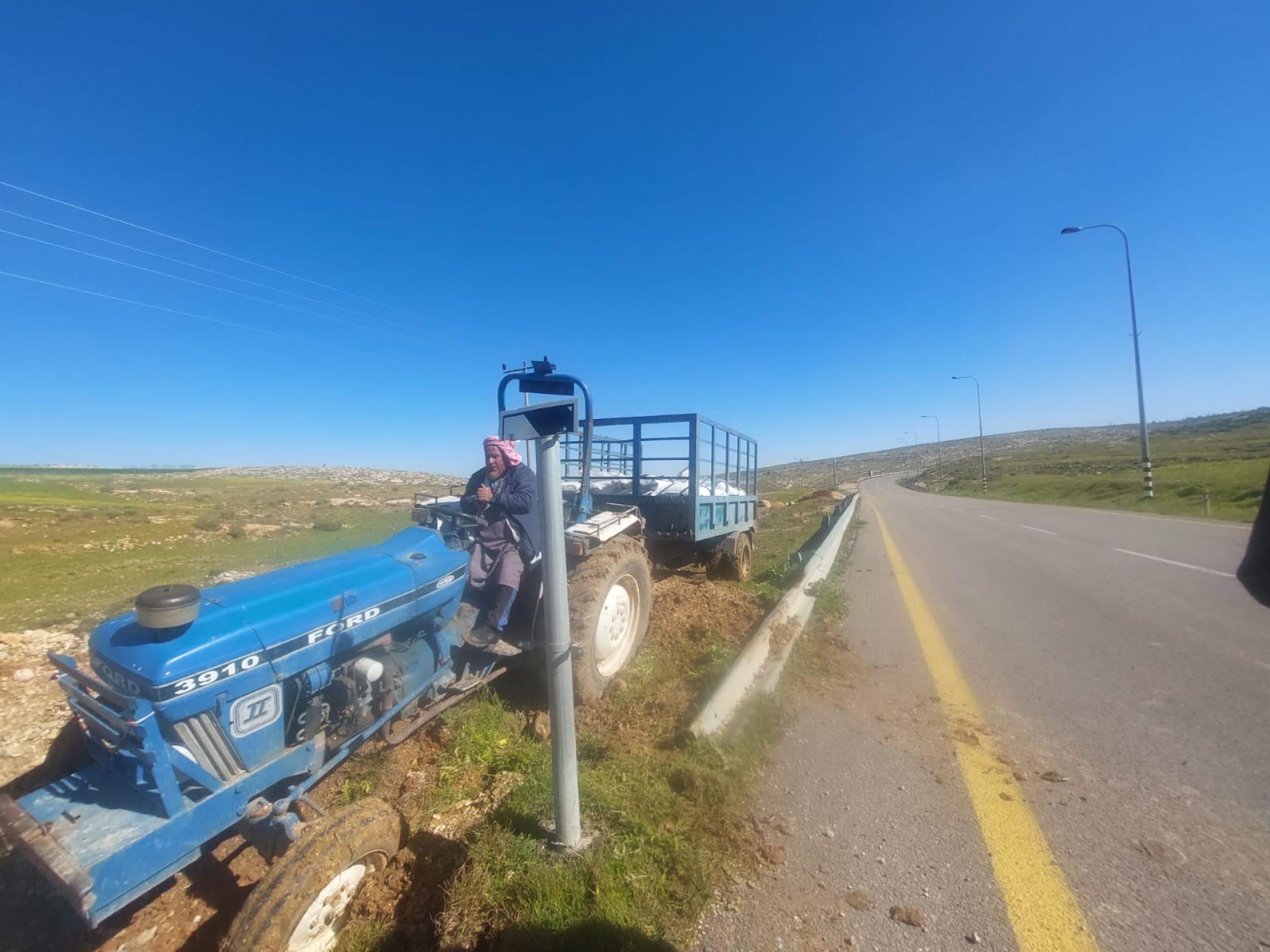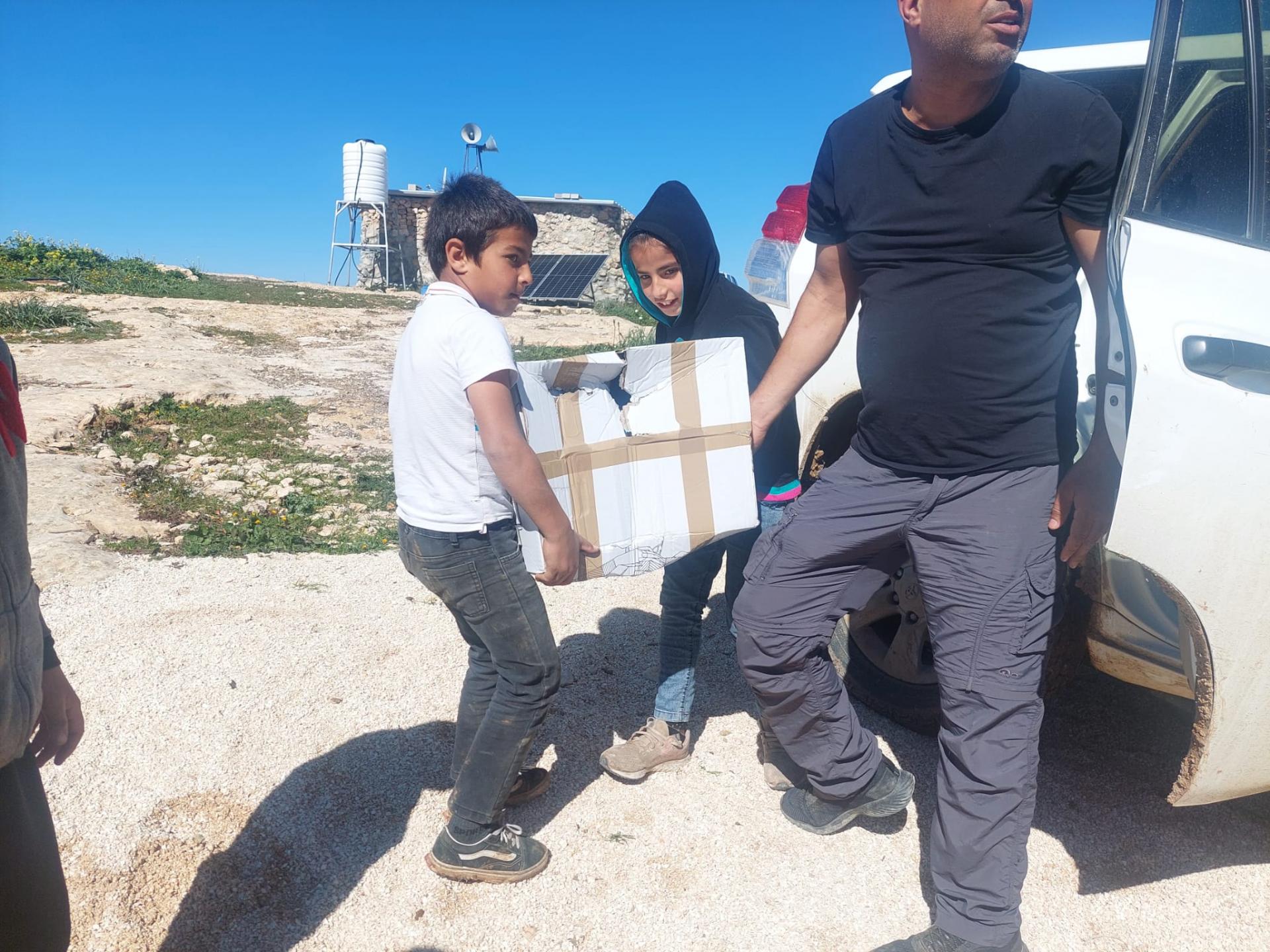Mufaqara - an improvement in the conduct of the police
We went to At- Tuwani to meet Anton from the Rabbinical Voice for Human Rights organization. He contacted us when he heard that we were also bringing food supplies to the villages now besieged by the settlers and the army. Happy to say that they have food packages prepared by volunteers from various organizations and he wants to bring them to us so we can distribute them to those who need them. So, we were happy to meet with him and Gerry another volunteer, and they brought us a lot of very large boxes containing basic foodstuffs: flour, oil, rice, pasta, legumes and tuna and also some sweets for children, very similar to the contents of our own shopping.
In At-Tuwani we were given a place to store them and we will also distribute the same boxes as you can see in the photos, decorated by a great graffiti artist from Tel Aviv whose fake name is Know hope.
But before we entered At-Tuwani, we saw a tractor that sank in the mud because it was pulling a cart with sacks of flour. The man who was looking for any way to cross from Yatta to the road and enter At-Tuwani, was not successful because all the roads were blocked by stones and piles of dirt from the last time.
Part of the same malicious trend of the authorities, to encircle, block and stifle attempts to lead a simple life even in the Palestinian territories themselves.
The tractor dug in and sank and could not be rescued until people from At-Tuwani saw it and with joint forces dragged it out of the mud.
But in the meantime, soldiers arrived and began to interrogate, check and photograph us as well. Some of them are masked.
When I asked what they were hiding from, they didn't answer when I said: "You must believe you are doing something good", now one answered me with a bare face: "You also believe you are doing good."
I answered: "Yes, but from the other side of the barricade." They took pictures of the vehicle and us and we took pictures of them.
The delay was short and we continued to At-Tuwani to meet those whom we wanted to meet. At At- Tuwani we were happy to meet Anton and Gerry with the beautiful food packages they brought.
Salem Adra recounts an incident from the previous day:
Havat Ma'on settlers and soldiers tried to arrest four herders on the grounds that they came too close to the farm although they were actually grazing as usual in their territories. In the end they were not arrested by the settlers because the police arrived and again, they were the ones who prevented their arrest, but they were evicted from their land. Then the settlers came with their herds to the area and to the well to declare by their actions that they are the masters of the land.
Salem points out that there is an improvement in the conduct of the police. They behave nicely, he says, fairly and not violently, and do their job, he says, against the violence of the army now full of terrorists.
Another act from the previous day: they talk about a man who wanted to arrive in his car by law to Yatta. Suddenly, settlers and soldiers arrived, punctured his tires, took the keys and left.
Why? Because they can.
A chronicle of evil.
After we said goodbye to Anton and Gerry, we drove with some of the packages they brought to Mufaqara, to Fadel and his family. They are also besieged from all sides and now on the hill opposite a bus has appeared that is used for the residence of a new settler and next to it is also a tent.
Fadel says the man arrived after the 7.10. As part of what we see: settlements and new Israeli flags pop up like mushrooms after the rain. We are told that the man who destroyed the Jabarin family's house in Sha'ab al-Butum lived there. When Fadel complained to the police about him because he was constantly threatening and restricting his steps, the policemen told him: he is an officer, he has greater authority than theirs and they have no ability to influence (?) and we ask: who is the important man who runs everything there, who suddenly sits there on the hill?
To the God of the Shin Bet the solutions.
Fadel says that the situation now continues to be difficult. All the roads were closed, and he is not allowed to move with his herd more than a hundred meters.
No work, no freedom of movement.
There is no security.
He hopes that the war will end and he can return to his territories. He asks that we find volunteers to live with him and help him deal with the situation. He will give them housing and food, just so that he does not have to be on his own.
We met the people of Operation Dove in At-Tuwani and we heard from them that they accompany shepherds but they are few and do not go to other places. They used to accompany the children to school, but since the teachers are unable to come to work, the schools are closed. Of course, at this time the army is not even thinking of allowing the teachers to come and go back to accompany the children from Umm Tuba on their way that passes at the foot of a residential farm that is so dangerous for children. This is how they live now.
The banality of evil.
Next week we will visit other settlements and bring them some ways to help them survive from your donations and the others.


